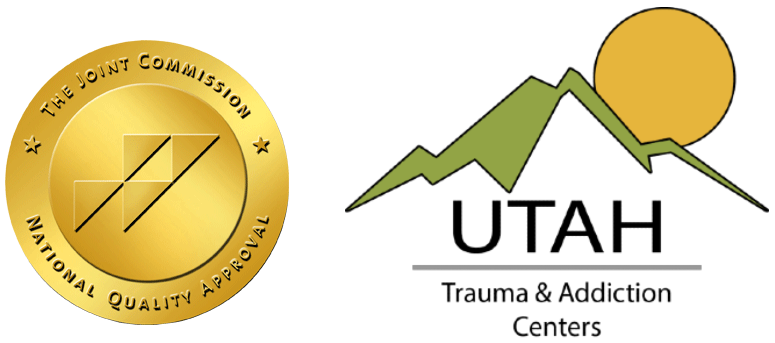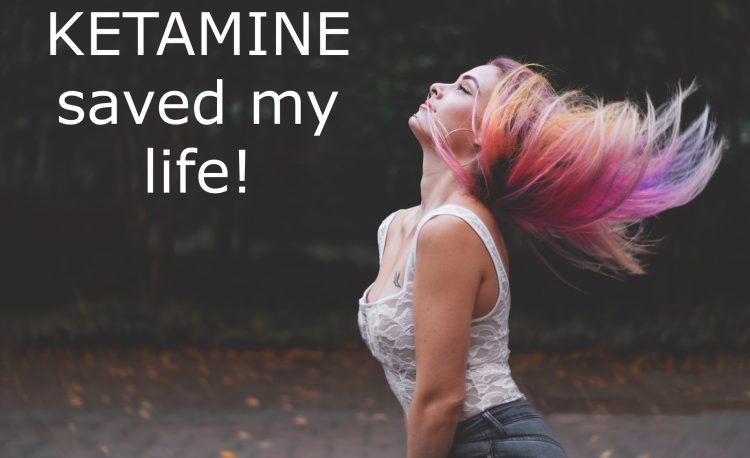Ketamine Addiction Treatment at our Utah Inpatient Rehab: Overcome Depression, Anxiety, PTSD and Substance Abuse!
Tens of millions of Americans are affected by depression, and this number is only growing. Many people suffering from depression attempt Big Pharma drugs like SSRIs, but they are often unsuccessful. Finding relief from depression can be difficult for many people. This can lead to hopelessness and worsening symptoms. This is why Utah Trauma & Addiction Centers offer ketamine to treat depression at our ketamine rehab clinic in Salt Lake City.
The FDA approved ketamine in the 1970’s as an anesthetic. It was used in Vietnam battlefields on soldiers. When injected, Ketamine medication can relieve pain almost immediately. Although patients retain their consciousness, they are often unable or unwilling to move. They report similar experiences to people who have used hallucinogens like LSD.
There are many theories among medical professionals about the mechanism of ketamine treatment for depressive symptoms. It is a well known consensus that ketamine causes brain changes that improve the connectivity between neurons and receptors. These connections might not work properly for those with depression. Some believe ketamine therapy can reduce inflammation; which can affect mood and thought patterns.
There are many levels of depression. Some people feel very blue, while others can’t get out of bed to go to work or fulfill their obligations. Sometimes depression can strike suddenly, while others can get worse over time.
Many people suffering from depression do not seek treatment. Depression is a condition that can deprive sufferers of their ability to motivate, achieve goals, and be willing to help others. Friends and family are often the first to seek help.
A prescription might be issued for antidepressants such as Prozac or Zoloft upon the first visit to a doctor. These drugs can be combined with talk therapy. Even when therapy and drugs work well, patients may feel worse for months. Ketamine treatment for depression can provide immediate results.
Many patients don’t feel much better if the drugs or therapies are not enough. Many people struggle with depression for years, and wonder if they will ever be able to overcome it. Many patients who believed they would never feel happy again have praised Ketamine as a lifesaver for treatment-resistant depression.
Utah Trauma & Addiction Centers ketamine treatment rehab is located in Utah although we serve the entire USA. We primarily provide ketamine to patients suffering from depression. Ketamine’s effects wear off shortly, so patients are monitored and then return the next day for a follow-up process therapy.
Ketamine treatment is preferable to other hallucinogenic drugs because it lasts for a shorter time (typically 20 to 60 minutes). Some of our patients may need additional ketamine treatment. Our ketamine clinic is for you if you are suffering from depression and you feel hopeless. You have the right to feel happy again.
Utah Trauma & Addiction Centers inpatient ketamine treatment medical team includes:
Medical Doctor
Registered Nurse
Master Level Clinical Therapists
Sex Addiction Certified Therapy
Case Managers
Nutritionist
Support Group Leaders
Recreational Therapy
Some services that are common at our ketamine residential treatment facility include:
Individual Therapy
Group Therapy
Biofeedback
Neurofeedback
Holistic Treatments
Family Therapy
12-Step Program
Anger Management
Medication Management
Therapeutic Intervention
The remarkable safe tool of ketamine therapy for patients with very difficult mental health issues has been demonstrated to be a powerful one. Many of our clients share their relief at finding a treatment that works after years of trying other unsuccessful therapies.
We love to hear about their successes and see the transformations they have experienced after treatment. The only problem with Ketamine therapy is the time it takes to be effective.
Ketamine is a great way to improve your healing. You can include it with traditional psychotherapy (or talk therapy) to help on many fronts. Utah Trauma & Addiction Centers therapists can help you navigate the process better.
Ketamine acts as a safety anchor for patients who are experiencing anxiety/depression or other negative emotions during their sessions. It is especially important to start doing the psychological work and dig deeper to discover the key factors that influence your current health. For patients with PTSD and depression, the role of the therapist as a guide is crucial.
Utah Trauma & Addiction Centers is able to take greater risks with what we see and understand due to having a safety protocol set in place. The patient may experience imagery and sensations during the ketamine-assisted psychotherapy. Our therapeutic interpreters can be very useful and can help you understand your psyche better. Our therapists are able to help you interpret and explore your deeper meanings.
One way we help you further explore is to have you write down what happened after your ketamine treatments. Utah Trauma & Addiction Centers also encourages our patients to discuss their experiences with one of our therapists. Many patients find it difficult to recall the images after a session.
The therapist can work more effectively with patients who are able to share their experiences during their session. This helps to make it flow better and provides more information. Instead of relying on memory, it is better to use metaphors.
Utah Trauma & Addiction Centers ketamine treatment for depression sessions can lead to new perspectives and insights that may not be possible if you were to do it alone. Our ketamine-assisted psychotherapy allows you to go deeper into your ongoing issues. You can also open up new ways of thinking and gain new perspectives that could lead to better lifestyle changes.
Many ailments can be treated with our ketamine-assisted psychotherapy. It is especially effective when combined with guided meditation and established breathing practices before beginning a treatment session. The meditative arts can help to create a healing space for the mind and set intention. This improves the effectiveness of ketamine treatment. Combining ketamine-assisted psychotherapy with meditation can result in longer-lasting effects.
Ketamine awakens the unconscious. It helps us see patterns and processes that are not visible to the conscious mind. It can be extremely useful for treating conditions that are resistant to treatment, such as depression, anxiety, PTSD, OCD, and substance abuse (drug/alcohol) addiction.
The standard of care for ketamine-assisted psychotherapy has been reduced to six sessions within a short time span of three weeks. Ketamine helps to get rid of the “ruts in your life” and allows for new learning. After six sessions, further treatment can be considered. Utah Trauma & Addiction Centers unique approach is to offer integrated therapy using the ketamine to help with change.
KAP (Ketamine Assisted Psychotherapy) combines the work of the therapist and your conscious mind to facilitate healing, growth and increased awareness. Each session is provided with a post-integration psychotherapist. We recommend that you attend additional sessions of psychotherapy each week.
The Utah Trauma & Addiction Centers Difference
We offer ketamine therapy at our residential inpatient rehab or in our outpatient setting. Utah Trauma & Addiction Centers is able to reduce the cost of therapy and increase ketamine’s effectiveness through our intimate and client-centered approach.
Most Frequently Asked Questions
1. Do I need to be referred to a psychiatrist?
No.
You may want to talk with your referring physician about your treatment and how it is progressing though.
2. What is the location of the ketamine treatment?
All treatments are done in our residential rehab home setting.
3. Is ketamine therapy a treatment for my depression, PTSD, anxiety or addiction?
According to research from major medical centers…in the last 15 years, 70% of patients can expect substantial, fast relief. Utah Trauma & Addiction Centers cannot predict the individual results. However, we ensure that treatment is tailored to your specific and individual needs; so we can give you the best chance of success.
4. How many ketamine treatment sessions will I get?
It will all depend on how you respond. The majority of patients are treated with six ketamine treatment sessions. After that, we decide together on further ongoing treatment.
5. What happens after my ketamine sessions are complete?
After completing the initial series, patients decide to continue with a maintenance program or not. They may return for single treatments or use lozenges at home, or both, depending on our doctor’s recommendations. Patients vary in time between maintenance treatment sessions and it will often increase with age.
6. How soon will I feel better after ketamine-assisted psychotherapy?
Utah Trauma & Addiction Centers patients often feel better within hours of their first treatment. Patients who have thoughts of self-harm begin to notice their thoughts disappear. You may feel a sudden relief from dread or despair. Some of our patients might not notice any improvement in their mood until the third or fourth treatment. Most patients will notice an improvement after six treatments.
7. Do I need ketamine treatment throughout my life?
No.
Many patients find long-term relief after only 6 ketamine treatments.
8. What can I expect from ketamine-assisted psychotherapy?
The administration of ketamine takes between 40-60 minutes. Your weight determines the dose. You will not experience a loss in consciousness if the dose of ketamine you are given is not large. Many patients prefer to listen to music and wear sunglasses to enhance their experience.
Some patients may experience strange perceptions during ketamine treatment, such as seeing bright colors. Some patients report a “dissociative” or “out-of-body” experience. These effects are crucial for ketamine’s effectiveness.
The experiences are easy to tolerate and often pleasant for most patients. The dissociative effects of the drug quickly disappear once treatment is completed. Patients feel normal in about 30 minutes on average. There are no flashbacks or delayed effects.
9. Are there any side effects to ketamine treatment for depression?
Sometimes, patients may feel nausea after a session. To help, we often give counteracting pharmaceuticals to requesting patients. Remember to avoid eating or drinking hours before a treatment. Rarely, patients may experience a temporary headache. After your session, patients can expect to feel tired. Patients who are at high risk of seizures may experience one; but they are very rare. Before you receive ketamine therapy, talk to your doctor if you have a seizure disorder.
10. What medical conditions might prevent me from receiving ketamine treatment?
There are many, and we screen all patients to determine if ketamine is the best treatment option. Before you get your first session, Utah Trauma & Addiction Centers will discuss any contraindications with you. Ketamine treatment is not recommended for anyone who has had psychosis within the past year or has a history of schizophrenia.
11. Is ketamine addictive?
No.
All providers follow an evidence-based protocol that uses dosages that are unlikely to have you become addicted to.
12. Do I have to bring someone if I am doing these ketamine treatment sessions on an outpatient basis?
While you don’t need someone to accompany you or bring you along during treatment, we do ask that someone take you home. You are advised not to drive your car until the morning after your ketamine treatment.
13. Do I have to eat or drink before my appointment?
For the four hours before your appointment, you cannot eat. Clear liquids may be consumed up to 2 hours prior to your session.
14. What if I take psychiatric medication that interferes with ketamine treatment?
Antidepressant medication (SSRIs/MAOIs and tricyclics) do not interact with ketamine, and should not be stopped. Ketamine treatment may provide relief while antidepressant medication is still in effect. It is important to consult your doctor before you decrease or stop taking any prescription medication.
15. What insurance companies will pay for ketamine therapy?
Insurance companies are currently unable to pay/reimburse for ketamine therapy in the treatment of anxiety and mood disorders.
If you feel ketamine-assisted psychotherapy is right for you, then give Utah Trauma & Addiction Centers a call today!

